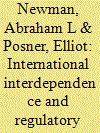|
|
|
Sort Order |
|
|
|
Items / Page
|
|
|
|
|
|
|
| Srl | Item |
| 1 |
ID:
110779


|
|
|
|
|
| Publication |
2011.
|
| Summary/Abstract |
This article revisits a fundamental question of international political economy: when does cross-border economic interdependence become a source of power. The view that economic interdependence is a source of potential power, not just mutual benefits, has a long lineage traceable to political realism, organizational economics, Ricardian trade theory, and structural Marxism, and researchers typically focus on preferred causal variables in isolation. Despite important contributions, little attention has been paid to understanding the interactions of multiple perspectives on asymmetric interdependence, or to making sense of contradictory expectations of the various models. As a consequence scholars engaged in globalization debates, such as those about policy convergence or private actor governance, frequently talk past one another. To deduce expectations about the relationship between power and interdependence, we build a model synthesizing standard approaches that analyze the effects of market size and market scope separately, and then add the critical variable of jurisdictional boundaries. By decoupling geography and authority, our analysis produces a respecification of classic interdependence models and advances core international political economy debates concerning power dynamics in a globalized economy.
|
|
|
|
|
|
|
|
|
|
|
|
|
|
|
|
| 2 |
ID:
092084


|
|
|
|
|
| Publication |
2009.
|
| Summary/Abstract |
This article explains a shift in the way transatlantic authorities managed conflicts over the cross-border regulation of securities markets: from cooperation skewed heavily toward the preferences of U.S. officials and accepted grudgingly by European counterparts; to a Euro-American regulatory condominium characterized by close interactions among decision makers and mutual accommodation. In the final decades of the twentieth century, the asymmetric influence wielded by U.S. securities market authorities had few parallels in other regulatory areas. Why, then, did U.S. officials become more accommodating and European authorities more influential, and why did the turning point occur in 2002 and 2003, an unlikely moment for intensified transatlantic sovereignty sharing? My study shows that institutional change inside the EU recast the North Atlantic balance of regulatory leverage and thereby was the primary factor behind the reshaping of transatlantic cooperation. Internal EU regulatory centralization changed the expectations of U.S. and European firms and authorities and generated new incentives in Washington, D.C., for accommodation and closer transatlantic coordination. My explanation differs from models that, accepting U.S. financial pre-eminence as a given, attribute variance in cross-border regulatory cooperation to factors such as incentives derived from the particularities of issue areas or preferences rooted in domestic politics. While resonating with a well-established theme from the realist branch of IPE, my findings have broad theoretical significance, and open new avenues for dialogue between realists and constructivists about the social, political, and institutional foundations of power in global economic affairs. The transatlantic political process set off by financial transformation in Europe reveals contemporary sources of systemic change and raises questions about what the EU's ascendance as a global financial regulator will mean in the aftermath of the late-2000s crisis.
|
|
|
|
|
|
|
|
|
|
|
|
|
|
|
|
| 3 |
ID:
071926


|
|
|
|
|
| Publication |
2005.
|
| Summary/Abstract |
The article explains a curious turn in European political economies. Between 1995 and 2005 national financial elites in twelve Western European countries created almost twenty competing new stock markets designed to improve financing alternatives for entrepreneurial companies. For a region supposedly averse to risk and U.S.-style capitalism, it is surprising that most of the new markets were modeled on the U.S.-based Nasdaq Stock Market, an iconic American institution. The author's structured comparisons of the new markets to one another, to previous ones, and to proposals that never saw the light of day reveal that the primary causes behind the creation, form, and timing of Europe's new markets lie in the political skills, motivations, and actions of supranational European Union bureaucrats. Challenging leading social science explanations for the cross-border convergence of domestic institutions, these findings show that the accumulated effects of day-to-day action by these supranational bureaucrats are potential causes of institutional innovation. The argument adds to a growing body of detailed empirical research on the domestic and global impact of the European regional polity and contributes to scholarly debates about market formation.
|
|
|
|
|
|
|
|
|
|
|
|
|
|
|
|
|
|
|
|
|